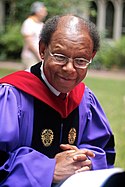James H. Cone Quote
The cross and the lynching tree interpret each other. Both were public spectacles, shameful events, instruments of punishment reserved for the most despised people in society. Any genuine theology and any genuine preaching of the Christian gospel must be measured against the test of the scandal of the cross and the lynching tree. 'Jesus did not die a gentle death like Socrates, with his cup of hemlock....Rather, he died like a [lynched black victim] or a common [black] criminal in torment, on the tree of shame.' The crowd's shout 'Crucify him!' (Mk 15:14) anticipated the white mob's shout 'Lynch him!' Jesus' agonizing final cry of abandonment from the cross, 'My God, my God, why have you forsaken me?' (Mk 15:34), was similar to the lynched victim Sam Hose's awful scream as he drew his last breath, 'Oh, my God! Oh, Jesus.' In each case it was a cruel, agonizing, and contemptible death.
The cross and the lynching tree interpret each other. Both were public spectacles, shameful events, instruments of punishment reserved for the most despised people in society. Any genuine theology and any genuine preaching of the Christian gospel must be measured against the test of the scandal of the cross and the lynching tree. 'Jesus did not die a gentle death like Socrates, with his cup of hemlock....Rather, he died like a [lynched black victim] or a common [black] criminal in torment, on the tree of shame.' The crowd's shout 'Crucify him!' (Mk 15:14) anticipated the white mob's shout 'Lynch him!' Jesus' agonizing final cry of abandonment from the cross, 'My God, my God, why have you forsaken me?' (Mk 15:34), was similar to the lynched victim Sam Hose's awful scream as he drew his last breath, 'Oh, my God! Oh, Jesus.' In each case it was a cruel, agonizing, and contemptible death.
Related Quotes
Dad?" Jesus asked."Yes, son?" God asked."Why are people so scared of dying?" Jesus asked."Because they believe that they only get one life and then they die," God said."But dad, nothing ever dies," Je...
Christians sometimes make themselves into elephants afraid of mice. You have the Creator of the universe on your side; not to mention, you've been given eternal life. 'Whom or what shall you fear?' To...
About James H. Cone
Cone's work was influential from the time of the book's publication and his work remains so today. His work has been both used and critiqued inside and outside the African-American theological community. He was the Charles Augustus Briggs Distinguished Professor of Systematic Theology at Columbia University-affiliated Union Theological Seminary until his death.
